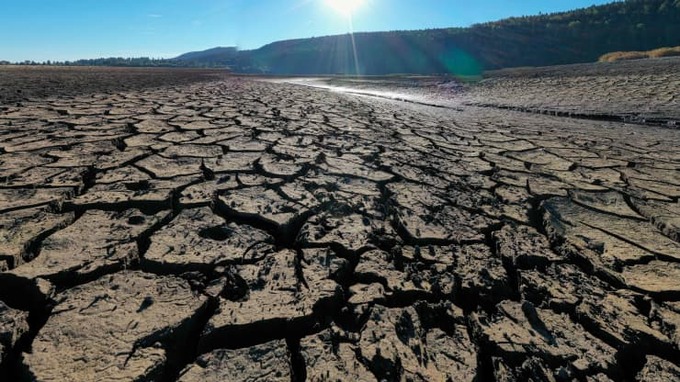November 24, 2025 | 17:45 GMT +7
November 24, 2025 | 17:45 GMT +7
Hotline: 0913.378.918
November 24, 2025 | 17:45 GMT +7
Hotline: 0913.378.918

This photo taken on August 3, 2022, shows the dried “Lac de l’Entonnoir” known as “Lac du Bouverans” in Bouverans, eastern France.
The August report of the European Drought Observatory (EDO), overseen by the European Commission, said 47 per cent of Europe is under warning conditions, with clear deficit of soil moisture, and 17 per cent in a state of alert, in which vegetation is affected.
"The severe drought affecting many regions of Europe since the beginning of the year has been further expanding and worsening as of early August," the report said, adding that the western Europe-Mediterranean region was likely to experience warmer and drier than normal conditions until November.
Much of Europe has faced weeks of baking temperatures this summer, which worsened the drought, caused wildfires, set off health warnings, and prompted calls for more action to tackle climate change.
The current drought appeared to be the worst in at least 500 years, assuming final data at the end of the season confirmed the preliminary assessment, the Commission said in a statement.
Summer crops have suffered, with 2022 yields for grain maize set to be 16 per cent below the average of the previous five years and soybean and sunflowers yields set to fall by 15 per cent and 12 per cent respectively.
Hydropower generation has been hit, with further impact on other power producers due to a shortage of water to feed cooling systems.
Low water levels have hampered inland shipping, such as along the Rhine, with reduced shipping loads affecting coal and oil transport.
The EDO said mid-August rainfall may have alleviated conditions, but in some cases it had come with thunderstorms that caused further damage.
The observatory's drought indicator is derived from measurements of precipitation, soil moisture and the fraction of solar radiation absorbed by plants for photosynthesis.
Record-breaking temperatures in Europe this summer have disrupted transportation, displaced thousands of people, and resulted in hundreds of heat-related deaths. The heat has also exacerbated wildfires, which have grown more destructive in recent years.
“The combination of a severe drought and heatwaves has created an unprecedented stress on water levels in the entire EU,” European Innovation Commissioner Mariya Gabriel said in a statement. “We are currently noticing a wildfires season sensibly above the average and an important impact on crops production.”
The Western Europe-Mediterranean region will likely see warmer and drier than usual conditions until November, the report said.
Climate change has made high temperatures and droughts more intense and widespread. And lower nighttime temperatures that typically provide critical relief from the hot days are disappearing as the planet warms.
Water and heat stress have slashed Europe’s 2022 crop yields, with forecasts for grain maize, soybean and sunflowers expected to be 16%, 15% and 12% below the average of the previous five years, respectively.
A lack of rainfall has also affected river discharges widely across Europe. Reduced water volume has hit the energy sector for hydropower generation and cooling systems of other power plants.
Drought hazard has been rising most notably in Belgium, France, Germany, Hungary, Italy, Luxembourg, Moldova, the Netherlands, northern Serbia, Portugal, Romania, Spain, Ukraine and the U.K, the report said.
(RT; CNBC)

(VAN) Brazil's COP30 presidency pushed through a compromise climate deal on Saturday that would boost finance for poor nations coping with global warming but that omitted any mention of the fossil fuels driving it.

(VAN) Poultry farmers in the UK have been warned that they could face one of the worst winters yet for bird flu.

(VAN) Prices of main-crop paddy have risen sharply, with jasmine rice hitting 16,100 baht per tonne — the highest level in years.

(VAN) In Brazil, FAO unveiled a series of reports and initiatives showing how sustainable agrifood systems are a solution to the climate crisis.

(VAN) With names like neodymium and dysprosium, rare-earth elements sound exotic — and their perceived scarcity has only added to the mystique.

(VAN) In a new study published in Trends in Biotechnology, researchers used a gene-editing technology called CRISPR to increase a fungus's production efficiency and cut its production-related environmental impact by as much as 61%- all without adding any foreign DNA.

(VAN) A top official in Beijing’s Cop delegation says China is committed to clean energy – but US’s absence is a problem.